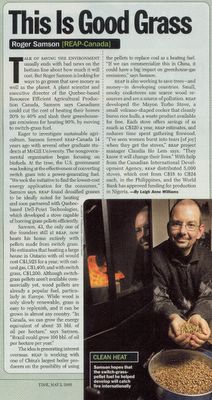Published on May 2nd, 2005, the article entitled "Made in Canada, Green Ideas" explains how four people have dedicated their time and efforts to making the world richer -- or at least a lot cleaner.

This is Good Grass: Roger Samson in Time Magazine
Talk of saving the environment usually ends with bad news on the bottom line about how much it will cost. But Roger Samson is looking for ways to go green that save money as well as the planet. A plant scientist and executive director of the Quebec-based Resource Efficient Agricultural Production Canada, Samson says Canadians could cut the cost of heating their homes 20% to 40% and slash their greenhouse-gas emissions for heating 90%, by moving to switch-grass fuel.
Eager to investigate sustainable agriculture, Samson formed REAP-Canada 14 years ago with several other graduate students at McGill University. The nongovernmental organization began focusing on biofuels. At the time, the U.S. government was looking at the effectiveness of converting switch grass into a power-generating fuel. "We took the initiative to find the lowest-cost energy application for the consumer," Samson says. REAP found densified grasses to be ideally suited for heating and soon partnered with Quebec-based Dell-Point Technologies, which developed a stove capable of burning grass pellets efficiently.
Samson, 43, the only one of the founders still at REAP, now heats his home entirely with pellets made from switch grass. He estimates that heating a large house in Ontario with oil would cost C$1,925 for a year; with natural gas, C$1,400; and with switch grass, C$1,200. Although switch-grass pellets aren't available commercially yet, wood pellets are already a popular fuel, particularly in Europe. While wood is only slowly renewable, grass is easy to replenish, and it can be grown in almost any country. "In Canada, we can grow the energy equivalent of about 35 bbl. of oil per hectare," says Samson. "Brazil could grow 100 bbl. of oil per hectare per year."
The idea is generating interest overseas. REAP is working with one of China's largest boiler producers on the possibility of using the pellets to replace coal as a heating fuel. "If we can commercialize this in China, it could have a big impact on greenhouse-gas emissions," says Samson.
REAP is also working to save trees-and money-in developing countries. Small, smoky cookstoves use scarce wood resources and are a source of pollution.
REAP developed the Mayon Turbo Stove, a small volcano-shaped cooker that cleanly burns rice hulls, a waste product available for free. Each stove offers savings of as much as C$120 a year, REAP estimates, and reduces time spent gathering firewood. "I've seen women burst into tears [of joy] when they get the stoves," REAP project manager Claudia Ho Lem says. "They know it will change their lives." With help from the Canadian International Development Agency, REAP distributed 5,000 stoves, which cost from C$18 to C$24 each, in the Philippines, and the World Bank has approved funding for production in Nigeria. -By Leigh Anne Williams

1 Comments:
Yours By Design Heating and Cooling is a full service Heating, Ventilation, and Air Conditioning (HVAC) contractor based in Blaine, MN
installing residential heating and air and commercial heating and air.**Heating****Cooling**heating warehouseheating warehouse
Post a Comment
<< Home